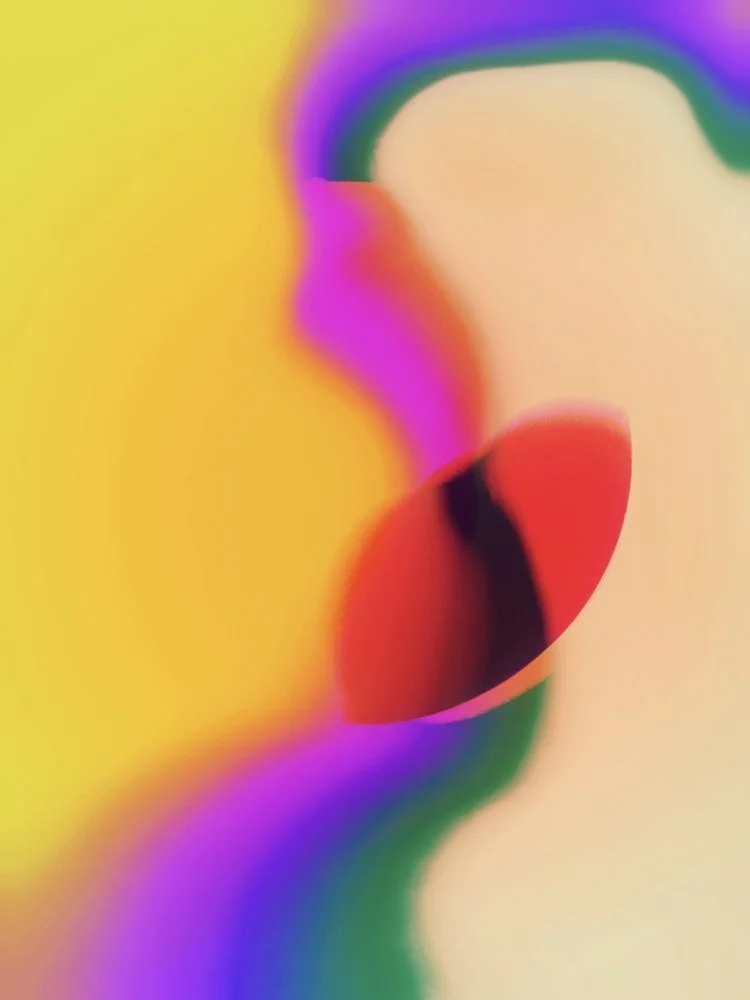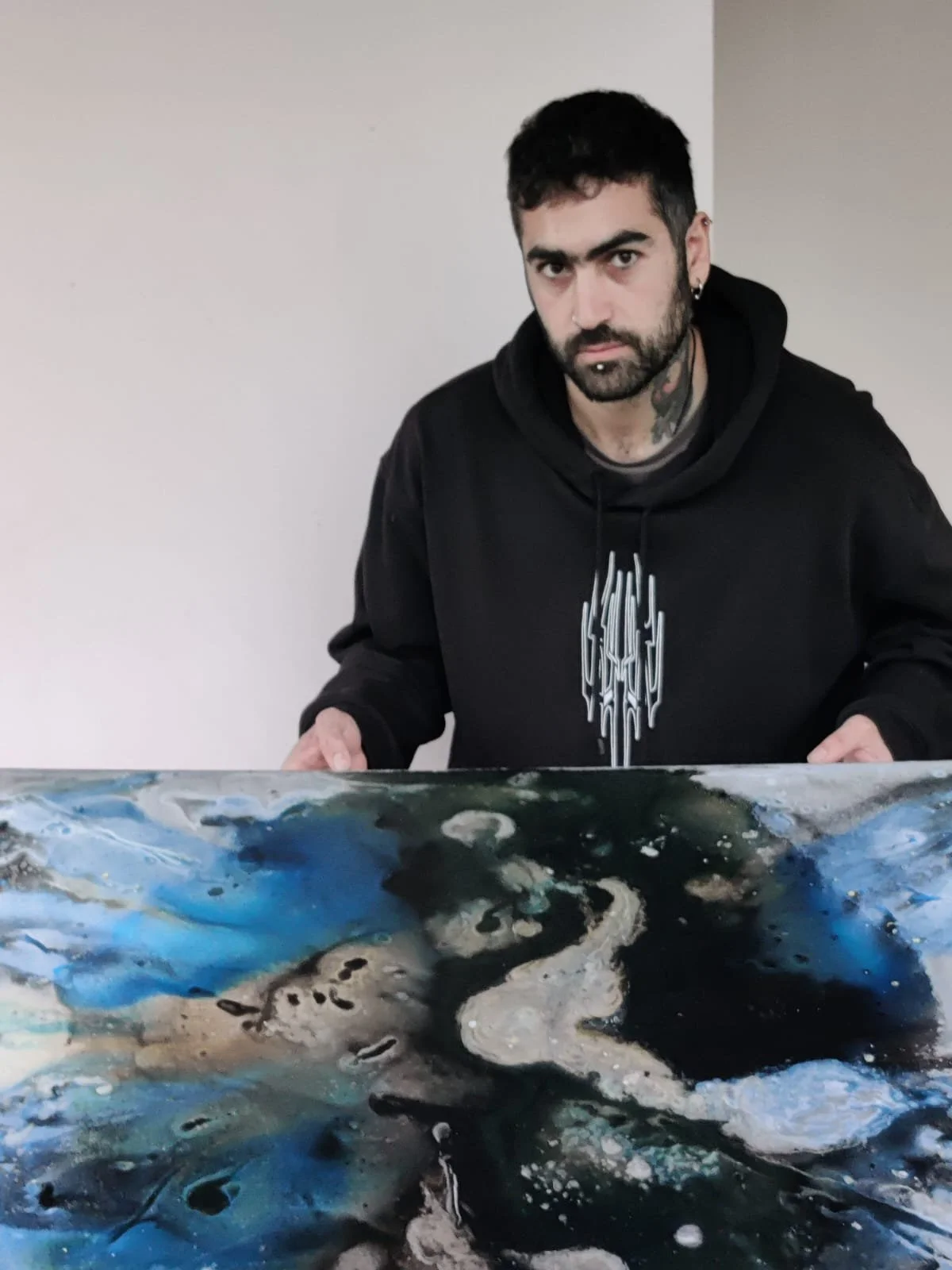10 Questions with Carol Camp
Carol Camp was born in São Paulo, Brazil, in 1995. Throughout her childhood and adolescence, she experimented with digital and analog photography, collages, as well as digital photo manipulation, and web design. She moved to Los Angeles at 18 years old and attended the New York Film Academy, where she produced, wrote, and directed short films. After graduating, she worked in Hollywood on music video sets as an art director and made a living as a film colorist on short and feature films for over four years.
Meanwhile, she also studied Studio Arts at West Los Angeles College, diving deeper into art-making with drawings, paintings, and sculptures. Now, Carol lives in São Paulo and works mostly with photography manipulation, video art, paintings, and poetry.
Carol Camp portrait
ARTIST STATEMENT
“For as long as I remember, I have been acutely aware of the present. The present is the thing you try desperately to get hold of but are forced to watch slip through your fingers. I see every second fading into the blurry everything else - blurry in a way that it all becomes indiscernible. I then watch, in some sort of fantasy my mind manages to stitch together, all the alternatives that die with every breath I take. I see trees as links between society, and find beauty in the unmixed paint eternalized in a classic painting, and in an artist’s innocent fingerprints on the back of a canvas. With my art, I attempt to make the now - not the idea of it, but its intricacies - tangible. Using bright colors and pure black, I investigate the contrast between the so-clear now and the ever-fading past. I find the lowest common denominator of every moment I find myself in, in hopes of eternalizing them. I look for the transient truth, and find it by disintegrating images, combining them, or designing their soul from scratch.” - Carol Camp
The Hidden Now Series - Kugelblitz, 2019 © Carol Camp
INTERVIEW
You are very young, but you have already developed very interesting projects. When did you decide to become an artist and how did you start experimenting with art?
I don't think I ever decided to be an artist - it wasn't a conscious decision. I used to draw a lot as a young kid, then I got into photography when I was about eleven or twelve. I started making silly music videos with my friends around that time as well, and learning about editing and image manipulation. I just needed to express myself, I think. I was a very shy and introverted kid with very few friends, so I needed to let the thoughts out somehow. Nothing has changed in that regard.
What do you wish you knew about Contemporary Art before you got started?
This is something I still need to remind myself of every day: talent is not enough in the contemporary art world. I mean that in two ways. First, it doesn't matter how talented you are if you don't work hard until your hands, eyes, or heart start bleeding. You need to constantly learn and evolve both as an artist and as a person in order to materialize your ideas and for them to be perceived accurately. Second, it doesn't matter how talented you are and how hard you work if you don't know the right people and don't have your head stuck so far up your own ass, you can no longer tell what's good and bad anymore. It's all a big scam. I'm trying to find my way around it.
You work with both photography and painting. How do you choose your mediums and what significance do they have for you?
I work with photography, painting, video, sculpture, poetry, life. Whatever I can get my hands on to pluck out a thought that is lingering in my brain. Photography is easy and cheap, so it's my go-to, but it lacks the physicality of paintings and sculptures, so it won't ever be as good in my eyes. Getting lost in front of a canvas is the closest we'll ever get to eternity.
The Hidden Now Series - Bright Spot, 2020 © Carol Camp
The Hidden Now Series - Chrome, 2020 © Carol Camp
The Hidden Now Series - The Death of Jean Cocteau I, 2020 © Carol Camp
The Hidden Now Series - The Death of Jean Cocteau II, 2020 © Carol Camp
In your series "The Hidden Now" you use smartphone photography that you manipulate into almost abstract forms. What are you trying to communicate with this series?
The hopeless longing for the eternal in an ephemeral reality. I take a photo of the most mundane thing - a window, a hallway, my bedside table - a moment that would otherwise fall into the depths of my memory and be forgotten within seconds. I take it, and I capture it, I eternalize its beauty. The very fact that I am looking at this thing and that thing, despite everything it has been and will become - in that moment, in that split second - is all mine. So I take it to my own future, in which it shines brightly instead of fading away.
What other themes do you pursue? And where do you find inspiration?
Most of my work is about time. More specifically, about my facticity and the impossibilities it imposes. This has always been a source of angst in my life and, therefore, the theme I discuss most often. Now aesthetically, I find inspiration in nature - in farmers' markets, in a garden, a sunset. Nothing man-made will ever come close to such beauty. But of course, I can also appreciate good paintings, interior design, architecture, cinema. Everything can be a source of inspiration if we look at it a certain way.
On the contrary, in your #0k series, you use physical elements to alter the photos, as a "response to society's current obsession with perfection". How did you come up with this idea? And what do you think art can do in fighting this recurring obsession in our society?
I went to film school in Los Angeles, which taught me more about people than it did about film. People there are so obsessed with fitting in, with building a world in which the likelihood of success is so high that you lose anything that would make you stand out. Filmmakers cared more about the price of a cinematographer's camera, for instance, than their ability to capture a feeling. That always felt so bizarre to me, and that's where the idea came from. I wanted to prove myself right; I wanted to show that a low-resolution photograph can be as meaningful, if not more so, than a regular "4k" image. So I used a high-resolution camera and placed oils, fabrics, and pieces of plastic between the camera and the subject. It felt good, like holding up a middle finger to Hollywood in my own little world. And of course, then I saw the similarities between those images and the way I think of memories - fading, melting, disintegrating away in our minds.
0k Series - Sunshine, Photography, 2018 © Carol Camp
0k Series - Walk Down Oxford Ave, Photography, 2018 © Carol Camp
0k Series - Santa Monica Pier, Photography, 2018 © Carol Camp
What do you hope that the public takes away from this work?
I think it's our duty as artists to make works that can act as a mirror. But very few people will understand the message, and fewer still will be able to notice its role in their life - so it's never so much about them as it is about me.
Do you miss in-person exhibitions or find new stimulus and motivation from the shift to digital exhibitions? How did you adapt your work to the online presentations over the last year?
I'm pretty good at seeing the glass half full, despite my mind sometimes screaming otherwise, so I'm thankful for some of the changes this year has brought about - not only my personal ones, but in the art world as a whole. For example, digital exhibitions are allowing us to see more diverse work and more collaborations. I also think we are taking more risks now, because we know how fragile life is even if we don't.
Do you have any upcoming shows or collaborations you are looking forward to?
I have a few online shows coming up, but the project I am most excited about is The Creative Basement, as it embodies everything I believe in. It's an online, and eventually offline, social club for emerging artists with similar goals and interests. I grew up in a small city in Brazil with a non-existent art scene, and I always wonder how different my life would have been if I had access to a group of artists to experiment and collaborate with. As antisocial as I am, I know that having a community can make a difference. That's why I created the Basement. Facebook and Instagram can connect you to the world, but there's a lot of noise. Most of it is noise, actually. The Basement will be a carefully curated platform in which artists are free to express themselves and be heard. We are selecting people who are serious about their work, who are at a certain technical level to be able to not only take but also give back to the community.
0k Series - Ventura County, Photography, 2018 © Carol Camp
Finally, what are your plans for the rest of 2021 and for the future in general?
We are launching the Creative Basement in February, which is taking a lot of time and mental space. We're getting quite a few applications already, so we're going through them and setting everything up. That's definitely my most exciting project at the moment. Beyond that, my only plan is to keep making art. I hope to make something I like one of these days. That would be nice.



















